Deontology: A Superior Ethical Theory for Professional Practice
VerifiedAdded on 2023/06/10
|8
|2068
|445
AI Summary
This article discusses the superiority of deontology over utilitarianism and virtue theory in professional practice. It explains the concept of deontology and how it focuses on the morality of actions themselves instead of their consequences. It also highlights the challenges and limitations of deontology.
Contribute Materials
Your contribution can guide someone’s learning journey. Share your
documents today.
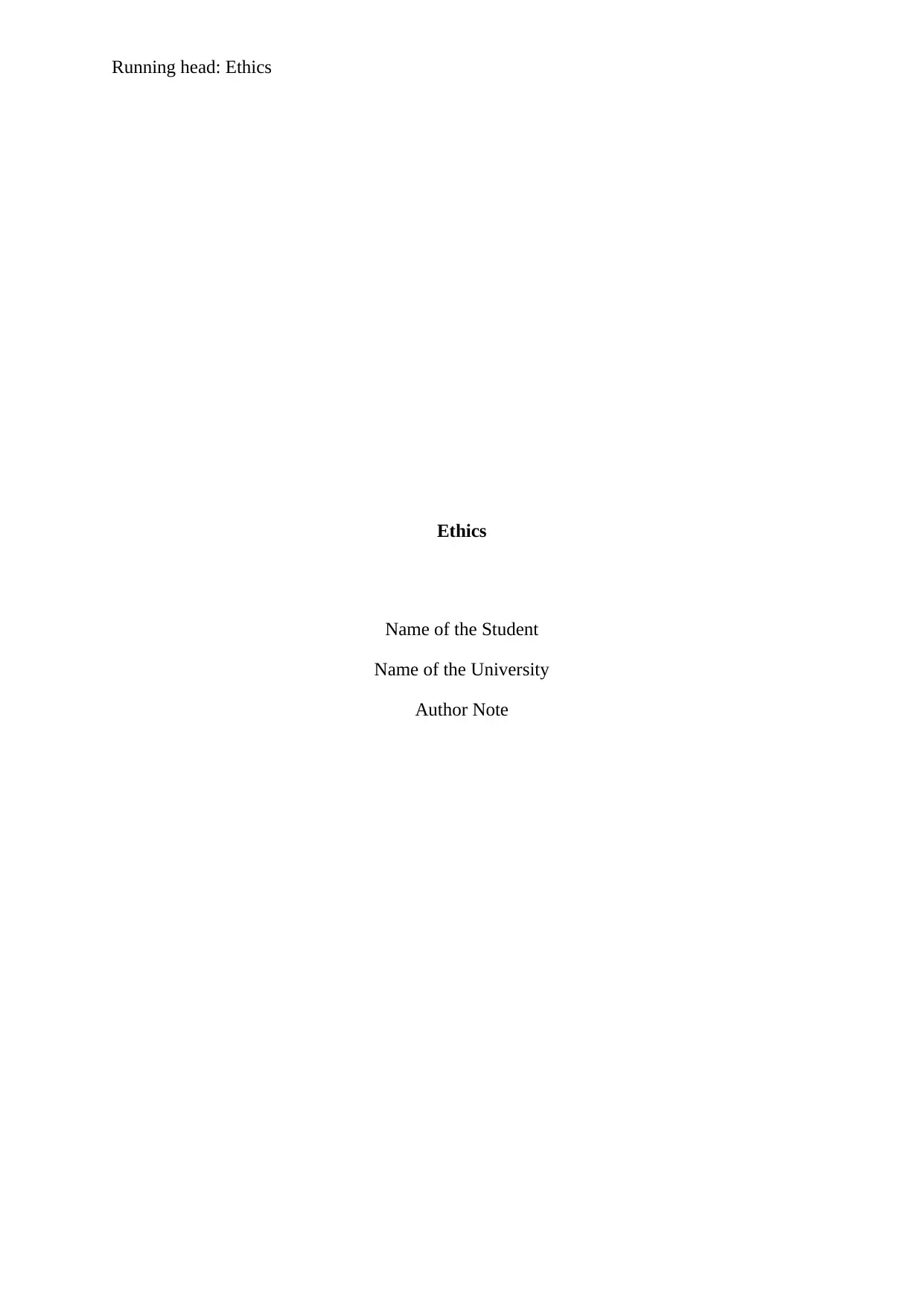
Running head: Ethics
Ethics
Name of the Student
Name of the University
Author Note
Ethics
Name of the Student
Name of the University
Author Note
Secure Best Marks with AI Grader
Need help grading? Try our AI Grader for instant feedback on your assignments.
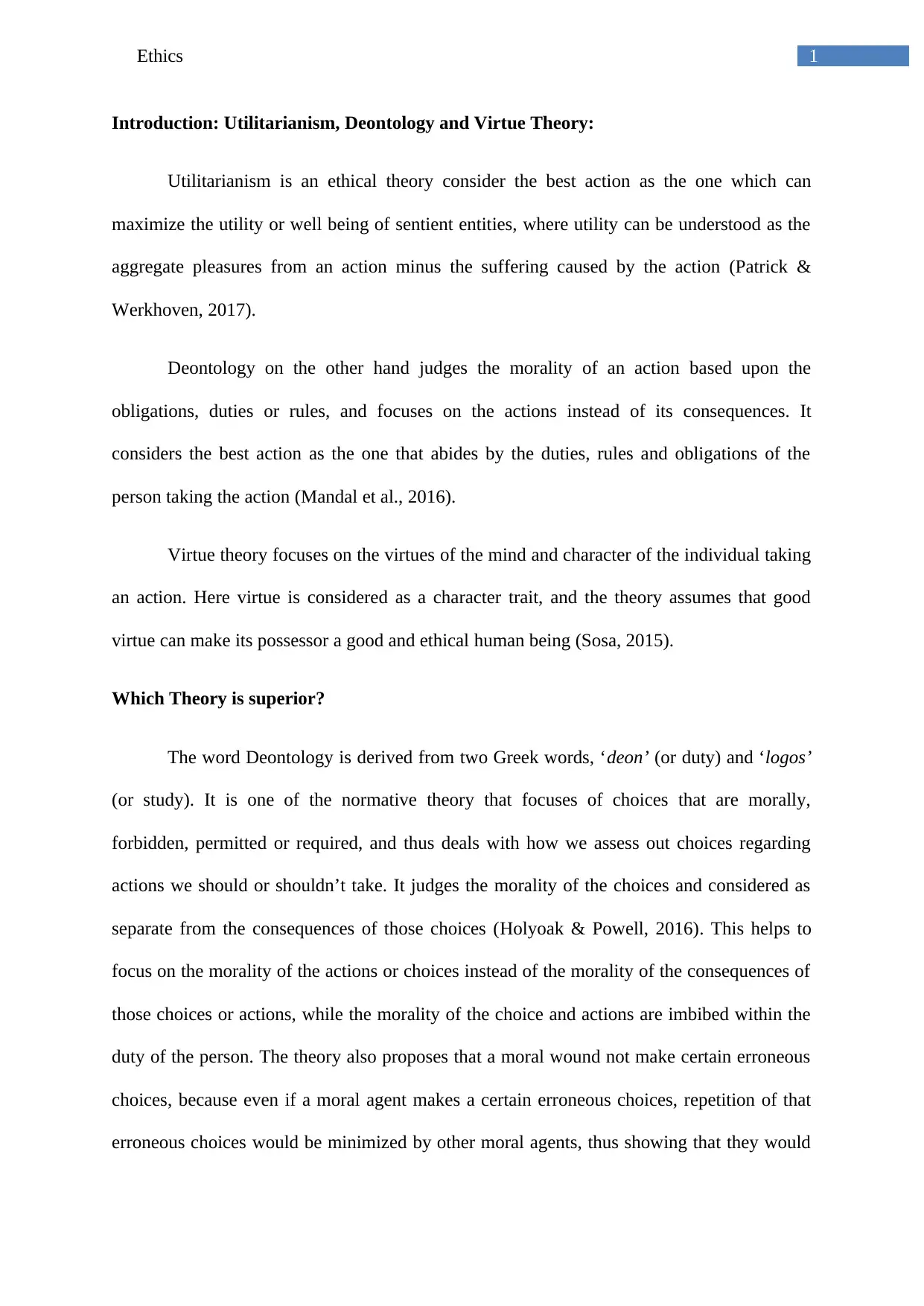
1Ethics
Introduction: Utilitarianism, Deontology and Virtue Theory:
Utilitarianism is an ethical theory consider the best action as the one which can
maximize the utility or well being of sentient entities, where utility can be understood as the
aggregate pleasures from an action minus the suffering caused by the action (Patrick &
Werkhoven, 2017).
Deontology on the other hand judges the morality of an action based upon the
obligations, duties or rules, and focuses on the actions instead of its consequences. It
considers the best action as the one that abides by the duties, rules and obligations of the
person taking the action (Mandal et al., 2016).
Virtue theory focuses on the virtues of the mind and character of the individual taking
an action. Here virtue is considered as a character trait, and the theory assumes that good
virtue can make its possessor a good and ethical human being (Sosa, 2015).
Which Theory is superior?
The word Deontology is derived from two Greek words, ‘deon’ (or duty) and ‘logos’
(or study). It is one of the normative theory that focuses of choices that are morally,
forbidden, permitted or required, and thus deals with how we assess out choices regarding
actions we should or shouldn’t take. It judges the morality of the choices and considered as
separate from the consequences of those choices (Holyoak & Powell, 2016). This helps to
focus on the morality of the actions or choices instead of the morality of the consequences of
those choices or actions, while the morality of the choice and actions are imbibed within the
duty of the person. The theory also proposes that a moral wound not make certain erroneous
choices, because even if a moral agent makes a certain erroneous choices, repetition of that
erroneous choices would be minimized by other moral agents, thus showing that they would
Introduction: Utilitarianism, Deontology and Virtue Theory:
Utilitarianism is an ethical theory consider the best action as the one which can
maximize the utility or well being of sentient entities, where utility can be understood as the
aggregate pleasures from an action minus the suffering caused by the action (Patrick &
Werkhoven, 2017).
Deontology on the other hand judges the morality of an action based upon the
obligations, duties or rules, and focuses on the actions instead of its consequences. It
considers the best action as the one that abides by the duties, rules and obligations of the
person taking the action (Mandal et al., 2016).
Virtue theory focuses on the virtues of the mind and character of the individual taking
an action. Here virtue is considered as a character trait, and the theory assumes that good
virtue can make its possessor a good and ethical human being (Sosa, 2015).
Which Theory is superior?
The word Deontology is derived from two Greek words, ‘deon’ (or duty) and ‘logos’
(or study). It is one of the normative theory that focuses of choices that are morally,
forbidden, permitted or required, and thus deals with how we assess out choices regarding
actions we should or shouldn’t take. It judges the morality of the choices and considered as
separate from the consequences of those choices (Holyoak & Powell, 2016). This helps to
focus on the morality of the actions or choices instead of the morality of the consequences of
those choices or actions, while the morality of the choice and actions are imbibed within the
duty of the person. The theory also proposes that a moral wound not make certain erroneous
choices, because even if a moral agent makes a certain erroneous choices, repetition of that
erroneous choices would be minimized by other moral agents, thus showing that they would
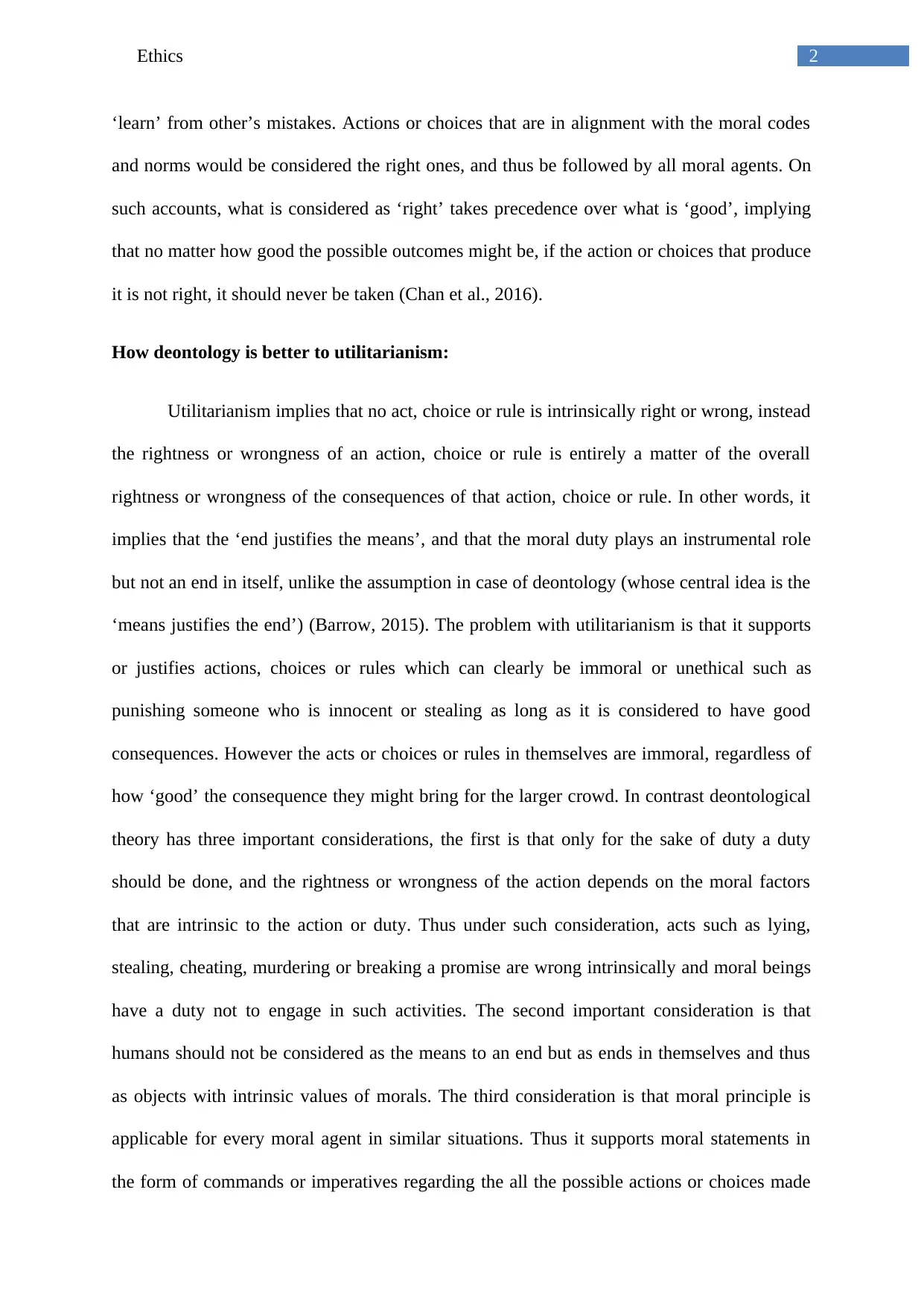
2Ethics
‘learn’ from other’s mistakes. Actions or choices that are in alignment with the moral codes
and norms would be considered the right ones, and thus be followed by all moral agents. On
such accounts, what is considered as ‘right’ takes precedence over what is ‘good’, implying
that no matter how good the possible outcomes might be, if the action or choices that produce
it is not right, it should never be taken (Chan et al., 2016).
How deontology is better to utilitarianism:
Utilitarianism implies that no act, choice or rule is intrinsically right or wrong, instead
the rightness or wrongness of an action, choice or rule is entirely a matter of the overall
rightness or wrongness of the consequences of that action, choice or rule. In other words, it
implies that the ‘end justifies the means’, and that the moral duty plays an instrumental role
but not an end in itself, unlike the assumption in case of deontology (whose central idea is the
‘means justifies the end’) (Barrow, 2015). The problem with utilitarianism is that it supports
or justifies actions, choices or rules which can clearly be immoral or unethical such as
punishing someone who is innocent or stealing as long as it is considered to have good
consequences. However the acts or choices or rules in themselves are immoral, regardless of
how ‘good’ the consequence they might bring for the larger crowd. In contrast deontological
theory has three important considerations, the first is that only for the sake of duty a duty
should be done, and the rightness or wrongness of the action depends on the moral factors
that are intrinsic to the action or duty. Thus under such consideration, acts such as lying,
stealing, cheating, murdering or breaking a promise are wrong intrinsically and moral beings
have a duty not to engage in such activities. The second important consideration is that
humans should not be considered as the means to an end but as ends in themselves and thus
as objects with intrinsic values of morals. The third consideration is that moral principle is
applicable for every moral agent in similar situations. Thus it supports moral statements in
the form of commands or imperatives regarding the all the possible actions or choices made
‘learn’ from other’s mistakes. Actions or choices that are in alignment with the moral codes
and norms would be considered the right ones, and thus be followed by all moral agents. On
such accounts, what is considered as ‘right’ takes precedence over what is ‘good’, implying
that no matter how good the possible outcomes might be, if the action or choices that produce
it is not right, it should never be taken (Chan et al., 2016).
How deontology is better to utilitarianism:
Utilitarianism implies that no act, choice or rule is intrinsically right or wrong, instead
the rightness or wrongness of an action, choice or rule is entirely a matter of the overall
rightness or wrongness of the consequences of that action, choice or rule. In other words, it
implies that the ‘end justifies the means’, and that the moral duty plays an instrumental role
but not an end in itself, unlike the assumption in case of deontology (whose central idea is the
‘means justifies the end’) (Barrow, 2015). The problem with utilitarianism is that it supports
or justifies actions, choices or rules which can clearly be immoral or unethical such as
punishing someone who is innocent or stealing as long as it is considered to have good
consequences. However the acts or choices or rules in themselves are immoral, regardless of
how ‘good’ the consequence they might bring for the larger crowd. In contrast deontological
theory has three important considerations, the first is that only for the sake of duty a duty
should be done, and the rightness or wrongness of the action depends on the moral factors
that are intrinsic to the action or duty. Thus under such consideration, acts such as lying,
stealing, cheating, murdering or breaking a promise are wrong intrinsically and moral beings
have a duty not to engage in such activities. The second important consideration is that
humans should not be considered as the means to an end but as ends in themselves and thus
as objects with intrinsic values of morals. The third consideration is that moral principle is
applicable for every moral agent in similar situations. Thus it supports moral statements in
the form of commands or imperatives regarding the all the possible actions or choices made
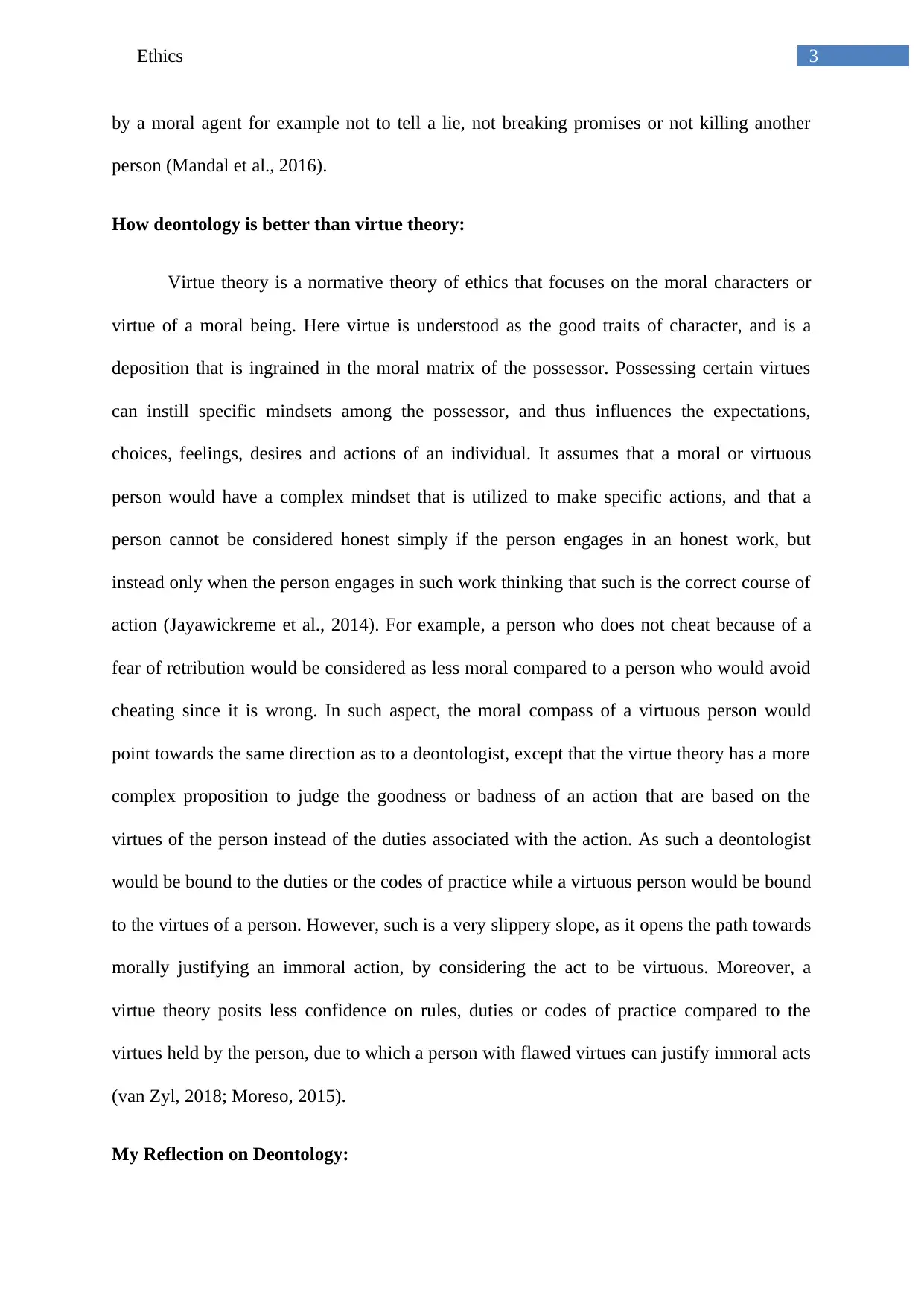
3Ethics
by a moral agent for example not to tell a lie, not breaking promises or not killing another
person (Mandal et al., 2016).
How deontology is better than virtue theory:
Virtue theory is a normative theory of ethics that focuses on the moral characters or
virtue of a moral being. Here virtue is understood as the good traits of character, and is a
deposition that is ingrained in the moral matrix of the possessor. Possessing certain virtues
can instill specific mindsets among the possessor, and thus influences the expectations,
choices, feelings, desires and actions of an individual. It assumes that a moral or virtuous
person would have a complex mindset that is utilized to make specific actions, and that a
person cannot be considered honest simply if the person engages in an honest work, but
instead only when the person engages in such work thinking that such is the correct course of
action (Jayawickreme et al., 2014). For example, a person who does not cheat because of a
fear of retribution would be considered as less moral compared to a person who would avoid
cheating since it is wrong. In such aspect, the moral compass of a virtuous person would
point towards the same direction as to a deontologist, except that the virtue theory has a more
complex proposition to judge the goodness or badness of an action that are based on the
virtues of the person instead of the duties associated with the action. As such a deontologist
would be bound to the duties or the codes of practice while a virtuous person would be bound
to the virtues of a person. However, such is a very slippery slope, as it opens the path towards
morally justifying an immoral action, by considering the act to be virtuous. Moreover, a
virtue theory posits less confidence on rules, duties or codes of practice compared to the
virtues held by the person, due to which a person with flawed virtues can justify immoral acts
(van Zyl, 2018; Moreso, 2015).
My Reflection on Deontology:
by a moral agent for example not to tell a lie, not breaking promises or not killing another
person (Mandal et al., 2016).
How deontology is better than virtue theory:
Virtue theory is a normative theory of ethics that focuses on the moral characters or
virtue of a moral being. Here virtue is understood as the good traits of character, and is a
deposition that is ingrained in the moral matrix of the possessor. Possessing certain virtues
can instill specific mindsets among the possessor, and thus influences the expectations,
choices, feelings, desires and actions of an individual. It assumes that a moral or virtuous
person would have a complex mindset that is utilized to make specific actions, and that a
person cannot be considered honest simply if the person engages in an honest work, but
instead only when the person engages in such work thinking that such is the correct course of
action (Jayawickreme et al., 2014). For example, a person who does not cheat because of a
fear of retribution would be considered as less moral compared to a person who would avoid
cheating since it is wrong. In such aspect, the moral compass of a virtuous person would
point towards the same direction as to a deontologist, except that the virtue theory has a more
complex proposition to judge the goodness or badness of an action that are based on the
virtues of the person instead of the duties associated with the action. As such a deontologist
would be bound to the duties or the codes of practice while a virtuous person would be bound
to the virtues of a person. However, such is a very slippery slope, as it opens the path towards
morally justifying an immoral action, by considering the act to be virtuous. Moreover, a
virtue theory posits less confidence on rules, duties or codes of practice compared to the
virtues held by the person, due to which a person with flawed virtues can justify immoral acts
(van Zyl, 2018; Moreso, 2015).
My Reflection on Deontology:
Secure Best Marks with AI Grader
Need help grading? Try our AI Grader for instant feedback on your assignments.
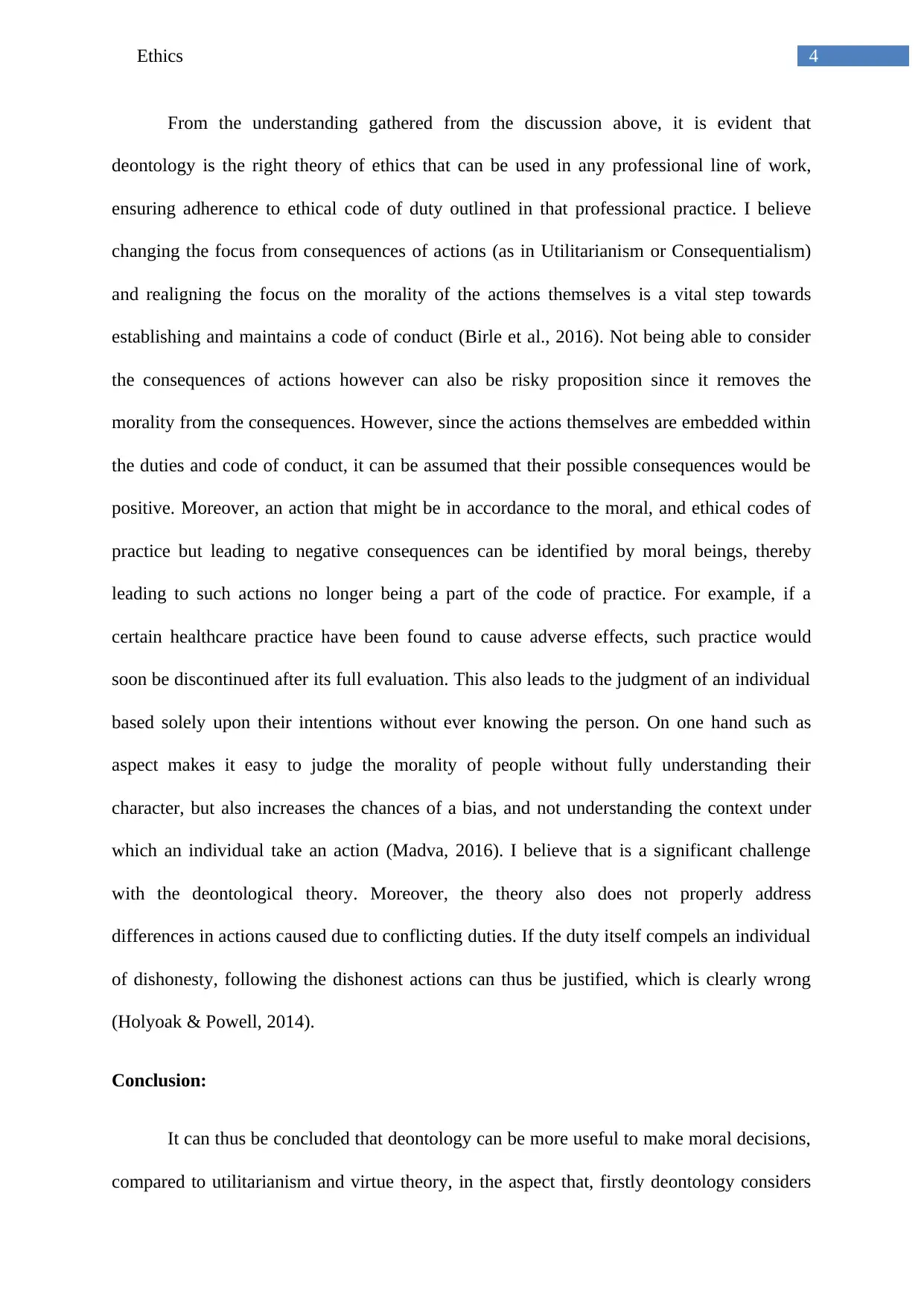
4Ethics
From the understanding gathered from the discussion above, it is evident that
deontology is the right theory of ethics that can be used in any professional line of work,
ensuring adherence to ethical code of duty outlined in that professional practice. I believe
changing the focus from consequences of actions (as in Utilitarianism or Consequentialism)
and realigning the focus on the morality of the actions themselves is a vital step towards
establishing and maintains a code of conduct (Birle et al., 2016). Not being able to consider
the consequences of actions however can also be risky proposition since it removes the
morality from the consequences. However, since the actions themselves are embedded within
the duties and code of conduct, it can be assumed that their possible consequences would be
positive. Moreover, an action that might be in accordance to the moral, and ethical codes of
practice but leading to negative consequences can be identified by moral beings, thereby
leading to such actions no longer being a part of the code of practice. For example, if a
certain healthcare practice have been found to cause adverse effects, such practice would
soon be discontinued after its full evaluation. This also leads to the judgment of an individual
based solely upon their intentions without ever knowing the person. On one hand such as
aspect makes it easy to judge the morality of people without fully understanding their
character, but also increases the chances of a bias, and not understanding the context under
which an individual take an action (Madva, 2016). I believe that is a significant challenge
with the deontological theory. Moreover, the theory also does not properly address
differences in actions caused due to conflicting duties. If the duty itself compels an individual
of dishonesty, following the dishonest actions can thus be justified, which is clearly wrong
(Holyoak & Powell, 2014).
Conclusion:
It can thus be concluded that deontology can be more useful to make moral decisions,
compared to utilitarianism and virtue theory, in the aspect that, firstly deontology considers
From the understanding gathered from the discussion above, it is evident that
deontology is the right theory of ethics that can be used in any professional line of work,
ensuring adherence to ethical code of duty outlined in that professional practice. I believe
changing the focus from consequences of actions (as in Utilitarianism or Consequentialism)
and realigning the focus on the morality of the actions themselves is a vital step towards
establishing and maintains a code of conduct (Birle et al., 2016). Not being able to consider
the consequences of actions however can also be risky proposition since it removes the
morality from the consequences. However, since the actions themselves are embedded within
the duties and code of conduct, it can be assumed that their possible consequences would be
positive. Moreover, an action that might be in accordance to the moral, and ethical codes of
practice but leading to negative consequences can be identified by moral beings, thereby
leading to such actions no longer being a part of the code of practice. For example, if a
certain healthcare practice have been found to cause adverse effects, such practice would
soon be discontinued after its full evaluation. This also leads to the judgment of an individual
based solely upon their intentions without ever knowing the person. On one hand such as
aspect makes it easy to judge the morality of people without fully understanding their
character, but also increases the chances of a bias, and not understanding the context under
which an individual take an action (Madva, 2016). I believe that is a significant challenge
with the deontological theory. Moreover, the theory also does not properly address
differences in actions caused due to conflicting duties. If the duty itself compels an individual
of dishonesty, following the dishonest actions can thus be justified, which is clearly wrong
(Holyoak & Powell, 2014).
Conclusion:
It can thus be concluded that deontology can be more useful to make moral decisions,
compared to utilitarianism and virtue theory, in the aspect that, firstly deontology considers
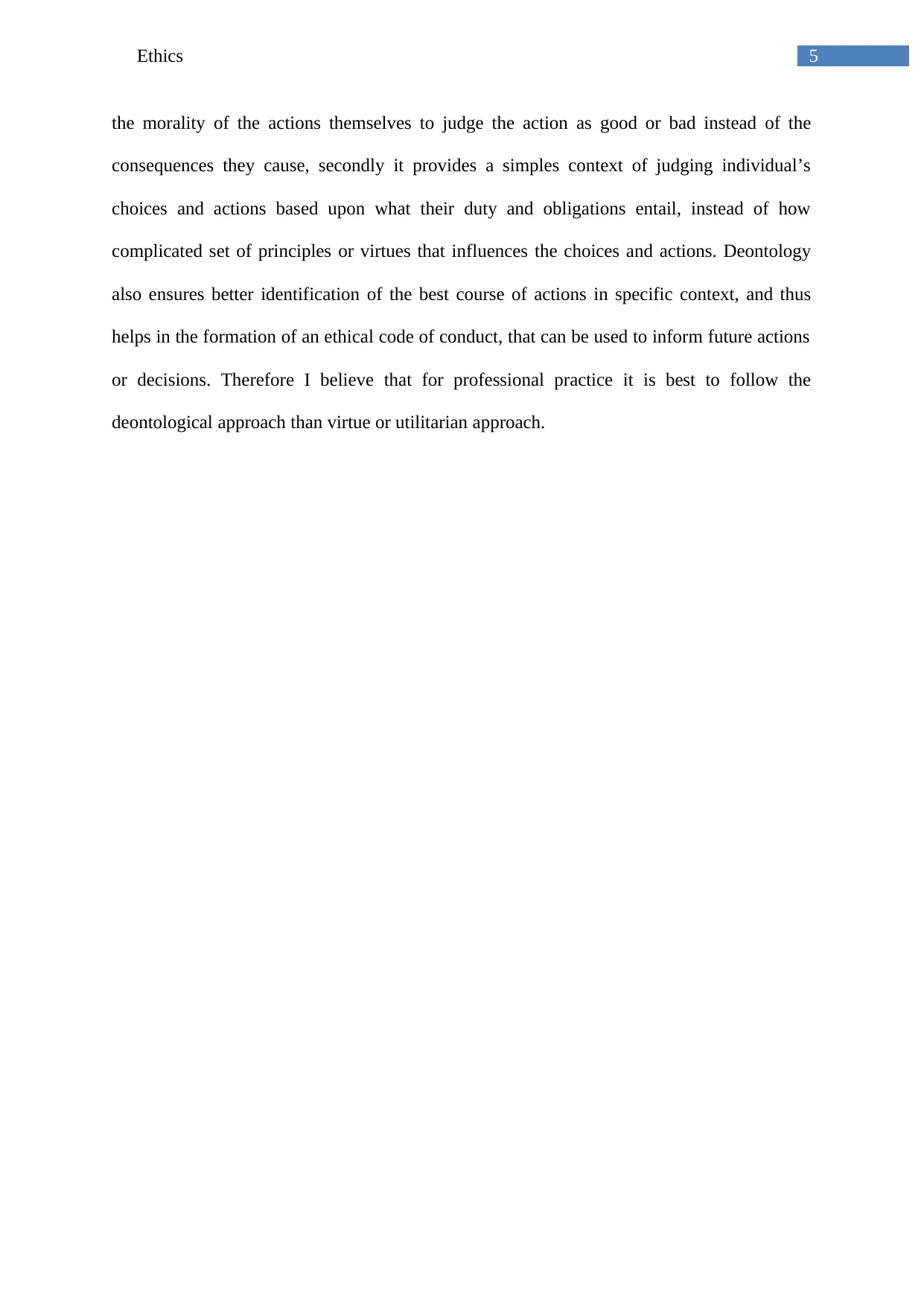
5Ethics
the morality of the actions themselves to judge the action as good or bad instead of the
consequences they cause, secondly it provides a simples context of judging individual’s
choices and actions based upon what their duty and obligations entail, instead of how
complicated set of principles or virtues that influences the choices and actions. Deontology
also ensures better identification of the best course of actions in specific context, and thus
helps in the formation of an ethical code of conduct, that can be used to inform future actions
or decisions. Therefore I believe that for professional practice it is best to follow the
deontological approach than virtue or utilitarian approach.
the morality of the actions themselves to judge the action as good or bad instead of the
consequences they cause, secondly it provides a simples context of judging individual’s
choices and actions based upon what their duty and obligations entail, instead of how
complicated set of principles or virtues that influences the choices and actions. Deontology
also ensures better identification of the best course of actions in specific context, and thus
helps in the formation of an ethical code of conduct, that can be used to inform future actions
or decisions. Therefore I believe that for professional practice it is best to follow the
deontological approach than virtue or utilitarian approach.
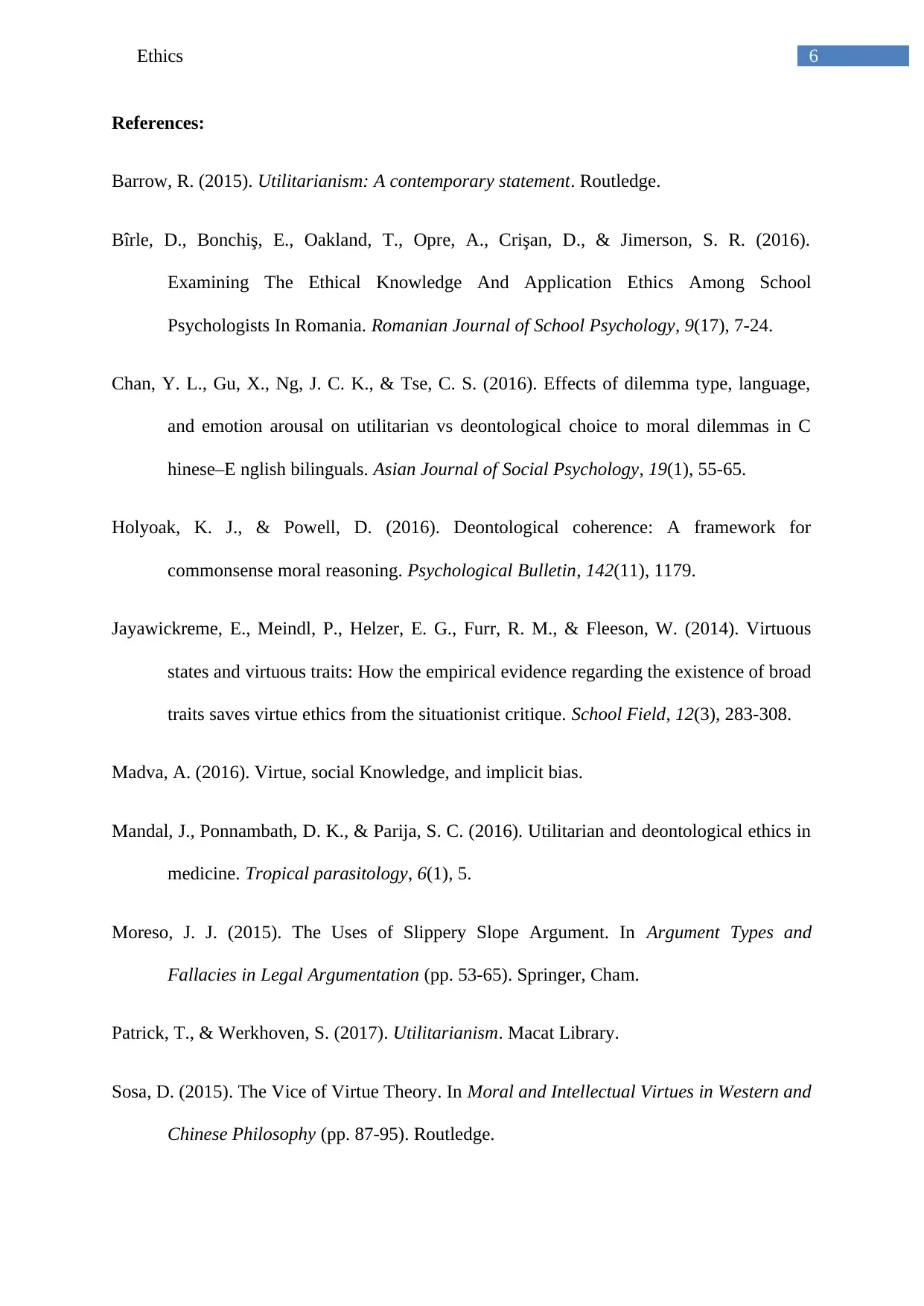
6Ethics
References:
Barrow, R. (2015). Utilitarianism: A contemporary statement. Routledge.
Bîrle, D., Bonchiş, E., Oakland, T., Opre, A., Crişan, D., & Jimerson, S. R. (2016).
Examining The Ethical Knowledge And Application Ethics Among School
Psychologists In Romania. Romanian Journal of School Psychology, 9(17), 7-24.
Chan, Y. L., Gu, X., Ng, J. C. K., & Tse, C. S. (2016). Effects of dilemma type, language,
and emotion arousal on utilitarian vs deontological choice to moral dilemmas in C
hinese–E nglish bilinguals. Asian Journal of Social Psychology, 19(1), 55-65.
Holyoak, K. J., & Powell, D. (2016). Deontological coherence: A framework for
commonsense moral reasoning. Psychological Bulletin, 142(11), 1179.
Jayawickreme, E., Meindl, P., Helzer, E. G., Furr, R. M., & Fleeson, W. (2014). Virtuous
states and virtuous traits: How the empirical evidence regarding the existence of broad
traits saves virtue ethics from the situationist critique. School Field, 12(3), 283-308.
Madva, A. (2016). Virtue, social Knowledge, and implicit bias.
Mandal, J., Ponnambath, D. K., & Parija, S. C. (2016). Utilitarian and deontological ethics in
medicine. Tropical parasitology, 6(1), 5.
Moreso, J. J. (2015). The Uses of Slippery Slope Argument. In Argument Types and
Fallacies in Legal Argumentation (pp. 53-65). Springer, Cham.
Patrick, T., & Werkhoven, S. (2017). Utilitarianism. Macat Library.
Sosa, D. (2015). The Vice of Virtue Theory. In Moral and Intellectual Virtues in Western and
Chinese Philosophy (pp. 87-95). Routledge.
References:
Barrow, R. (2015). Utilitarianism: A contemporary statement. Routledge.
Bîrle, D., Bonchiş, E., Oakland, T., Opre, A., Crişan, D., & Jimerson, S. R. (2016).
Examining The Ethical Knowledge And Application Ethics Among School
Psychologists In Romania. Romanian Journal of School Psychology, 9(17), 7-24.
Chan, Y. L., Gu, X., Ng, J. C. K., & Tse, C. S. (2016). Effects of dilemma type, language,
and emotion arousal on utilitarian vs deontological choice to moral dilemmas in C
hinese–E nglish bilinguals. Asian Journal of Social Psychology, 19(1), 55-65.
Holyoak, K. J., & Powell, D. (2016). Deontological coherence: A framework for
commonsense moral reasoning. Psychological Bulletin, 142(11), 1179.
Jayawickreme, E., Meindl, P., Helzer, E. G., Furr, R. M., & Fleeson, W. (2014). Virtuous
states and virtuous traits: How the empirical evidence regarding the existence of broad
traits saves virtue ethics from the situationist critique. School Field, 12(3), 283-308.
Madva, A. (2016). Virtue, social Knowledge, and implicit bias.
Mandal, J., Ponnambath, D. K., & Parija, S. C. (2016). Utilitarian and deontological ethics in
medicine. Tropical parasitology, 6(1), 5.
Moreso, J. J. (2015). The Uses of Slippery Slope Argument. In Argument Types and
Fallacies in Legal Argumentation (pp. 53-65). Springer, Cham.
Patrick, T., & Werkhoven, S. (2017). Utilitarianism. Macat Library.
Sosa, D. (2015). The Vice of Virtue Theory. In Moral and Intellectual Virtues in Western and
Chinese Philosophy (pp. 87-95). Routledge.
Paraphrase This Document
Need a fresh take? Get an instant paraphrase of this document with our AI Paraphraser

7Ethics
van Zyl, L. (2018). Virtue Ethics: A Contemporary Introduction. Routledge.
van Zyl, L. (2018). Virtue Ethics: A Contemporary Introduction. Routledge.
1 out of 8
Related Documents
Your All-in-One AI-Powered Toolkit for Academic Success.
+13062052269
info@desklib.com
Available 24*7 on WhatsApp / Email
![[object Object]](/_next/static/media/star-bottom.7253800d.svg)
Unlock your academic potential
© 2024 | Zucol Services PVT LTD | All rights reserved.





